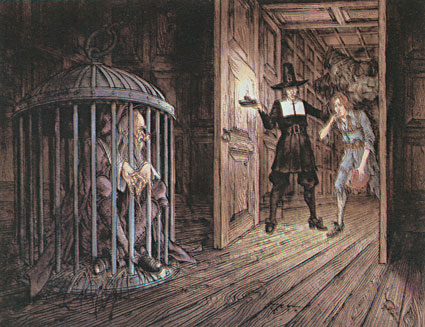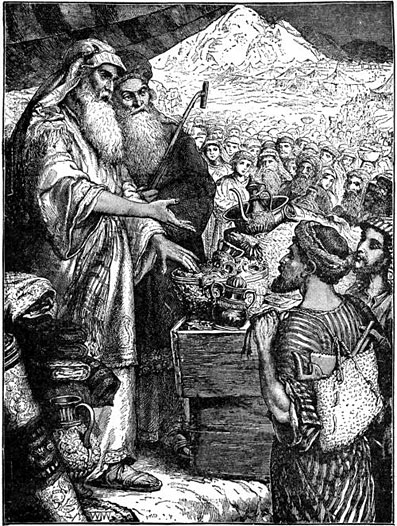Nov
10
2009

Some excerpts from James Jordan’s thought-provoking 2 part article:
“The ordination of women to the Christian ministry, specifically the pastoral office of overseeing worship and performing preaching and the Lord’s Supper, is a recent development in Church history. From the early church until the late 20th century, women were never ordained as ministers, not in any branch of the Church, East or West, Protestant or Catholic. Only in a few sects, almost always anti-theological and/or ‘pentecostal,’ were women ‘ordained.’
It is today often assumed that the Church has been wrong about this, universally and consistently, for nearly 2000 years. This assumption holds that the Holy Spirit has either misguided the Church on this matter, or that the Spirit has allowed the Church to remain in error, for His own good reasons, and is only now correcting that error; it is assumed that only now has the Church grown and developed to the point where she is able to recognize this error.”
Continue reading
Comments Off | tags: Adam, James Jordan, Worship | posted in Biblical Theology, Quotes
Sep
18
2009

I saw in my dream, that the Interpreter took Christian by the hand again, and led him into a very dark room, where there sat a man in an iron cage. Now the man seemed very sad. He sat with his eyes looking down to the ground, and his hands folded together, and he sighed as if his heart would break.
Then said Christian, “Who is this?”
“Talk with him and see,” said the Interpreter.
“What used you to be?” asked Christian.
“I was once a flourishing professor, both in my own eyes, and also in the eyes of others,” answered the man. “I was on my way, as I thought, to the Celestial City and I was confident that I would get there.”
“But what did you do to bring yourself to this condition?” Christian asked.
“I failed to keep watch,” the man replied. “I followed the pleasures of this world, which promised me all manner of delights. But they proved to be an empty bubble. And now I am shut up in this iron cage—a man of despair who can’t get out.”
No further explanations were given. No one said who put him there. But the Interpreter whispered to Christian:
“Bear well in mind what you have seen.” [1]
. . . . . . . . . . . . . . . . . . . . . . . . . . . . . . . . . . . . . . .
Another thought related to the ideas in Behind Closed Doors.
The whole aim of the construction process, whether in sex, foetal development, education, business, art, music, family or state government, is the ultimate revelation of a mature glory. We are given the opportunity to create, and that involves certain God-given freedoms. If the freedoms are abused, what we construct for ourselves is a cage. Lust is a cage. A dysfunctional family or state is a cage. Enforced egalitarian socio-economics is a cage. Undisciplined children are a cage.
Jesus laid down His life for this world, and the freedoms of western culture have been a direct outcome. In its final stages, we have rebelliously inverted each of these freedoms (including the economic ones) and turned both our Christian protection (including our God-given wealth) and Christian mandate into a cage. Ancient Israel did the same. Why does this inversion process seem such a logical path for fallen human nature?
Continue reading
3 comments | tags: Altar of the Abyss, Babel, Biblical worldview, Culture, Dominion Theology, Doug Wilson, Economics, Incense Altar, John Bunyan, Parenting, Politics, Postmillennialism, Solomon, Tabernacle, Worship, Worship as commerce | posted in Christian Life, Quotes
Jul
24
2009
from Manifesto on Psalms and Hymns
by Douglas Wilson (Introduction to the Cantus Christi Hymnal)

A common practice in our day is for Christians to speak of the “culture wars.” By this they usually mean the political and cultural skirmishes between leftist secular thinking and the more moderate and traditional thinking of believers. But the problem is that the phrase “culture wars” is a particularly inept way to refer to this problem. Continue reading
Comments Off | tags: Culture, Doug Wilson, Liturgy, Modernism, Music, Psalms, Worship | posted in Christian Life, Quotes
Jul
5
2009

You can listen to a 2009 series of lectures on worship by James Jordan here.
They will make you cry for the lack of Bible content (and understanding) in teaching today, and laugh at what gets passed off as instruction for better worship.
If many of the things he says sound bizarre, it’s because he’s being biblical. It’s Bible-strange, but it’s we who are estranged. He’ll give you enough to chew on for decades, and you’ll realise how deficient, gnostic, watered-down and compromised even the best of modern theology is.
But these are a sumptuous feast for worship leaders, in fact, anyone in church leadership. Go on, I dare you.
6 comments | tags: James Jordan, Worship | posted in Biblical Theology
Jul
3
2009
“Be meticulous to present yourself for the praise of God as an unashamed workman, cutting the word of truth in a straight line.” (II Timothy 2:15)
Is this verse simply teaching that if we “divide up” the Scriptures correctly, we’ll get an AWANA[1] merit badge from God? Hardly. It is flanked by condemnations of those who fight over the Scriptures to no profit, and those whose vain babblings are gangrenous.
Paul speaks of a soldier and a farmer, and then a productive workman. Paul is concerned about building saints and churches, and they are built by a straight and true cutting of the word. Like most of Paul’s statements, there is a very long, fully-loaded freight train of Old Testament history and typology right behind it, and it’s coming right at you, right now.
Continue reading
Comments Off | tags: Darius, David, Esther, Ezekiel's Temple, Nebuchadnezzar, New Jerusalem, oikoumene, Peter, Peter Leithart, Postmillennialism, Revelation, Solomon, Stigmata, Temple, Totus Christus, Worship | posted in Biblical Theology, Christian Life, The Last Days, The Restoration Era
May
2
2009
Peter Leithart writes:
Reflections on a class discussion earlier today about place, our connection to the ground, and gnosticism.
- Blood and soil are “powers” that can and have dominated human life, and caused lots of human misery.
- Jesus overcomes those powers. We are identified by water and feast, not by blood or color or place.
- YET (here’s where my thought is undeveloped): Jesus doesn’t just overcome and send the powers packing. He pacifies and reconciles powers; He turns them to the purposes of His kingdom (Col 1-2).
The dilemma: How to express the reconciliation of blood and soil without falling back into the old creation, and without going fascist? How to express Jesus’ pacification of “blood” without letting it usurp the place of the water, and how to express Jesus’ pacification of “soil” without letting it usurp the place of the feast?
Continue reading
Comments Off | tags: Atonement, Canaan, Communion, Compromise, Gnosticism, Herod, High Priest, Holy Place, Most Holy Place, nationalism, Nazirite, New earth, Nimrod, Peter Leithart, Worship | posted in Biblical Theology
Apr
15
2009
Is that all there is to it?
“Can it really be so simple?” That is the feeling we have about the church. She has been given a mission of global conquest. As Rudolf Schnackenburg has explained, “Through the Church, Christ wins increasingly his dominion over all things and draws them ever more powerfully and completely beneath himself as head… the Church’s mission is necessary and willed by Christ to bring the world of men and with this the whole of creation under his rule.” One cannot conceive of a more astounding project. Continue reading
Comments Off | tags: Baptism, Ecclesiology, Holy war, Peter Leithart, Power of the Gospel, Worship | posted in Biblical Theology
Apr
11
2009
In the New Testament and in the early church, preaching (heralding) was something done to outsiders, persuading them to repent and believe the gospel.

“…we face a situation today in most evangelical and Reformed churches in which the reading and preaching of Scripture is the only way in which the Word is made manifest in the lives of the saints. This is a real loss for the people of God. The result is the primacy of the preacher. The preacher not only does the only really important thing in the service (preach), he also composes (if he even does that) the prayers that are prayed, and he prays them by himself. It boils down very often to worship by proxy, exactly what the Reformation fought against. Only in the Lutheran and Episcopal churches is there more than a minimum of congregational participation, because of the use of prayer books.
Since all that is left is preaching, the act of preaching takes on dimensions foreign to the Bible. Continue reading
3 comments | tags: Communion, Ecclesiology, James Jordan, Preaching, Reformation, Worship | posted in Christian Life
Apr
11
2009
A worship service should follow the seven-fold Covenant pattern:
Call to Worship (Genesis – Sabbath)
…..Confession of Sin (Exodus – Passover)
……….Ascension of Praise (Leviticus – Firstfruits)
……………Teaching the Word (Numbers – Pentecost)
……….Offertory (Deuteronomy – Trumpets)
…..Communion (Joshua – Atonement)
Thanksgiving & Dismissal (Judges – Booths)

This pattern also structures the Creation week (Genesis 1), the Tabernacle speeches (Exodus 25-31) and the Ascension offering (Leviticus 1).
What is interesting is that the Firmament is Day 2 (Red Sea – death), but the Tabernacle puts it at Day 6 because Adam needs resurrection (Jordan).
So, in our services, at confession of sin, the saints are in the Laver. At Communion, the Laver is in the saints. We in Him and He in us.
Comments Off | tags: Feasts, Tabernacle, Worship | posted in Biblical Theology, Christian Life
Apr
10
2009
“What you are actually becoming in public is a public revelation of your true worship. What many call a ‘midlife crisis,’ for example, is simply idolatry catching up with a person.”
Doug Wilson, The Spirit of Accusation, Sermon Podcast, 7 January 09. Subscribe at www.christkirk.com
Comments Off | tags: Doug Wilson, Worship | posted in Quotes
































